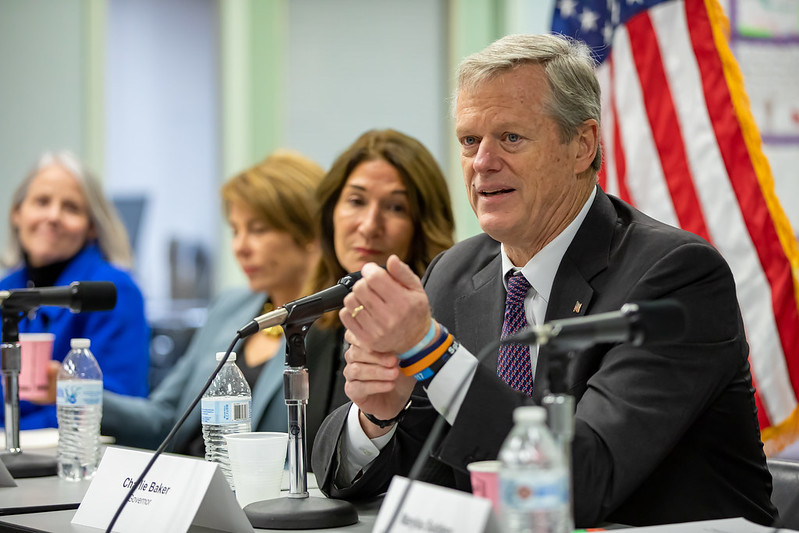latest
Massachusetts officials reflect on opioid crisis progress, setbacks

By Sam Drysdale
NOV. 29, 2022…..While boasting of “nation-leading policy and reforms” in Massachusetts related to the opioid epidemic, incoming and outgoing state executives agreed Tuesday that there is more work to be done.
State government has taken specific steps to invest in recovery programs, de-stigmatize opioid-use disorder, bolster law enforcement’s ability to get fentanyl off the streets, and hold opioid manufacturers accountable for irresponsible marketing, Gov. Charlie Baker, Lt. Gov. Karyn Polito and Attorney General Maura Healey said at a roundtable discussion at A New Way Peer Recovery Center in Quincy Tuesday morning.
Still, opioid overdoses have increased dramatically since 2000, and remain at elevated levels.
Annual reports from the Department of Public Health provide snapshots of the significant growth of the opioid crisis since 2000, when 375 Massachusetts residents died of opioid-related overdoses.
The 2,290 confirmed and suspected overdose deaths logged last year represent a 504 percent increase since 2000, and more than 24,000 Massachusetts residents have died from opioid overdoses during that time.
Just between 2020 and 2021 the rate of opioid deaths in Massachusetts climbed 9 percent.
Baker said Tuesday that the pandemic “was an incredible blow to the progress and the momentum that we had developed here in Massachusetts before the pandemic.”
“But I will say this, while everybody’s numbers look worse than they did before the pandemic, ours look dramatically better than they look in many other parts of the country,” Baker said.
With their time as Massachusetts’ gubernatorial team coming to an end, Baker and Polito said they are proud of looking back at the last eight years of increased funding to opioid recovery programs and harm reduction.
Since fiscal year 2023, budget spending in this area increased fivefold across several state agencies, from $119 million when Baker first took office to $597 million in the budget he signed in July, MASSterList reported Tuesday.
Baker sat at the roundtable discussion flanked by Polito, Healey and Secretary of Health and Human Services Marylou Sudders — the latter two of whom served as co-chairs on the governor’s opioid task force. Baker is leaving office in early January and his two consecutive terms coincided with two terms as attorney general for Healey, who was elected earlier this month to succeed him.
During his time in the corner office, Baker signed two landmark opioid bills. The first, passed in 2016, was the first law in the U.S. to limit initial opioid prescriptions to a seven-day supply, gave patients the ability to request that a doctor prescribe less than the standard number of pills and made screening of middle and high school students for signs of substance abuse more regular across the state.
The second law in 2018 expanded the use of medication-assisted treatment for addiction, recovery coaches and improved access to Naloxone, a drug designed to rapidly reverse opioid overdose.
Baker got teary-eyed at Tuesday’s event recalling a conversation he had with a Fall River mother whose son is in recovery from opioid addiction. Baker had given her a bracelet with information about where her son could get help years before, he said.
“I turned around and she came up to me and she said, ‘You gave me this bracelet two years ago when I saw you at another event and you gave it to me and told me to go and that it would help me and my son deal with his problem. And the reason I’m chasing you down is I want to give it back to you because it worked. And my son’s in recovery and we’re doing well and I want you to give this bracelet to somebody else and pay it forward,'” Baker said.
While the Legislature and governor’s office were focused on driving more opioid recovery-related spending into Massachusetts via new laws and budget increases, the attorney general was busy over the past few years taking opioid manufacturers to task.
Healey said Tuesday that her office had “no less than a dozen divisions” working on opioid-related matters over her two terms.
The attorney general has been part of a few high-profile, nationwide settlements over the years, including with the manufacturer of OxyContin, Purdue Pharma.
In 2019, when Purdue filed for Chapter 11 bankruptcy protection and announced that it had agreed to a roughly $10 billion settlement with 24 state attorneys general, Healey opposed the settlement as “incomplete” without the Sackler’s putting up some of their own personal fortunes.
At the time she said the deal, “doesn’t provide the kind of accountability and transparency that we need,” and held out for a stricter resolution, which eventually came in the way of about $90 million to Massachusetts to combat the opioid crisis.
Under a 2021 settlement with manufacturer Johnson & Johnson and three of the country’s largest opioid distributors, Massachusetts received $525 million to go toward opioid recovery programs and harm reduction. The first settlement payments reached Massachusetts this year and will continue in annual installments until 2038.
Most recently, Healey’s office announced earlier this month that Massachusetts is poised to receive more than $61 million out of a proposed nationwide settlement reached with Walmart over the company’s opioid dispensing practices. This settlement is currently being sent to 43 participating states for review and approval, and “parties are optimistic that the settlement will gain support of the required 43 states by the end of 2022,” Healey’s office said.
The state has received more than $750 million from opioid manufacturers and distributors in total, she said Tuesday.
“We’re going to continue to make progress on getting the resources in place to address substance use disorder, to address mental health issues, which we know for far too long in this country just haven’t been given the attention and the resources and the investment that has been needed,” Healey said. “But I think we’ve made great strides as a state to do that.”
She also mentioned the approximately $5 million the attorney general’s office has obtained over the last eight years from a partnership with the U.S. Department of Justice toward a law enforcement strike force to combat the trafficking of fentanyl — a potent synthetic opioid associated with increasing fatal overdoses — across New England.
Though Healey and Baker appeared to be in lock-step Tuesday, the governor-elect has implied in the past she might have a different stance on one of Baker’s steadfast opioid policies.
When asked in the spring if safe injection sites should feature in the regional response to the opioid crisis, Healey said she backs the controversial idea that for years has been stalled by threats of federal prosecution and Baker’s opposition.
“I certainly have supported efforts at harm reduction. Safe injection sites are part of that,” Healey said in April. “I think it’s up to communities and municipalities to work through some of that and what makes sense.”
“From the beginning, we have all recognized this as the public health crisis that it is, and it necessitates innovative thinking, innovative approaches, and certainly, we should do everything we can to save lives,” she added.
Safe injection sites weren’t among the topics of discussion Tuesday morning, but everyone present emphasized the importance of de-stigmatizing addiction.
“Much has changed over the last eight years in terms of people’s ability to share and be forthcoming. We need to continue to support that,” Healey said.







Fed Up
November 29, 2022 at 8:55 pm
The Pandemic made things worse? or the useless Massachusetts politicians response to it? ” 2 weeks to flatten the curve ” And in typical useless Massachusetts politician solution, throw more money at it. The state of Massachusetts is enabling drug addicts with their policies. Methadone mile ring a bell? People supplement their high with methadone. All the resources thrown at this and there are more addicts than ever! Wonder why?